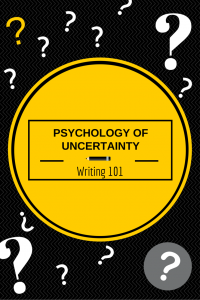Better the devil you know. . .
. . .than the devil you don’t. Perhaps you’ve heard this bit of folk wisdom. It reflects the common understanding that people abhor uncertainty. Predictability is a desired state, even if what is being predicted is negative—to the point of being disastrous, dangerous to the point of being life-threatening. Think prisoners/captives: one powerful way to break down their resistance, to garner compliance, is to increase their uncertainty. This can be done handily by having no natural daylight, and artificial light that cycles on randomly, along with an unpredictable eating schedule, unannounced questioning sessions that sometimes include physical abuse and sometimes don’t—anything that is disorienting. Whole books have been written on uncertainty and its management. (For example, see Psychology of Uncertainty by JD Smith, WE Shields, DP Britzman, D Brothers, and K Gordon; or The Social Psychology of Uncertainty management and System Justification by K VandenBos.)
The takeaway for writers is that to increase tension, increase uncertainty, decrease predictability.
Given the examples above, the application to action/adventure plots is obvious, but this writing rule applies across genres. Will he/won’t he call? Does she love me or not? Will this disease kill my child? Will my boss understand if I miss another staff meeting? Will I miss my plane? Does the murder suspect that I know he did it? If your story unfolds in a predictable pattern, your reader will lose interest. Why bother to read what you know is going to happen? Perhaps truly fabulous prose will keep some readers going, but why depend only on that?
